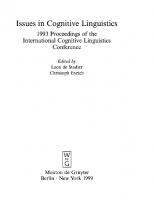Foreign Language Pedagogy in the Light of Cognitive Linguistics Research 3030587746, 9783030587741
This book constitutes another step of the linguistic community in translating cognitive linguistics research into a set
291 88 3MB
English Pages 131 [137] Year 2020
Table of contents :
Acknowledgements
Introduction
References
Contents
Cognitive Assumptions as the Foundations of Teaching
Effects of Non-native Versus Native Teaching Scenarios on L2 Student Emotions
1 Introduction
1.1 Shame
1.2 Fear
1.3 Anxiety
1.4 Anger
1.5 Depression
1.6 Pride
2 Method
2.1 Overview and Aims
2.2 Participants
2.3 Questionnaire
3 Results
4 Summary of Results
5 Discussion and Conclusions
References
Imagery as a Tool for Describing the Uses of French Tenses
1 Introduction
2 Cognitive Foundations of the Global Visualization Grammar
3 The Case of Global and Visualized Teaching of Tenses
4 Concluding Remarks
References
The Cognitive Grammar-Based Pedagogical Grammar—Tenses as Coherent Categories
1 Introduction
2 The Cognitive Grammar Background
3 An Application of CG to Language Pedagogy
4 A Comparison of Construals Encoded in Different Tenses
4.1 The Past Uses of the Constructions
4.2 The Present Uses of the Constructions
5 Conclusions
References
Cognitive Theories in Pedagogical Application
The Infinitive or the Gerund? Cognitive Linguistics in Teaching English Post-verbal Complementation
1 Introduction
2 A Cognitive Linguistic Approach to Grammar and Language Acquisition
3 A Cognitive Linguistic Approach to English Gerundive and To-Infinitival Complements
4 Cognitive Linguistics Applied: The English To-Infinitive and the Gerund in the L2 Classroom
4.1 The To-Infinitive
4.2 The Gerund
5 Experimental Study: Participants, Design and Results
6 Conclusion and Prospects for Future Research
References
The Cognitive Grammar View of Lexical Polysemy and Its Application in Foreign Language Pedagogy
1 Introduction
2 The Cognitive Grammar Approach to Polysemy
3 Application in the Classroom
3.1 A Presentation of the Technique
3.2 Some Case Studies
4 The Advantages of the Technique
References
A Cognitive Approach to Teaching Italian Prepositions to Polish Students
1 Introduction
2 The Theoretical Foundations
3 Prepositions in Cognitive Linguistics
4 Prepositions and Space Perception
5 Prepositions and Conceptualizations of Time
6 Prepositions and Abstract Concepts
7 A Proposal for Exercises on Prepositions
8 Conclusions
References
The LANGUAGE IS MUSIC Metaphor as a Didactic Tool in Descriptive Phonetics and Phonology Classroom
1 Introduction
2 The Conceptual Metaphor Theory
3 The Didactic Potential of CMT
4 The LANGUAGE IS MUSIC Metaphor in the Descriptive Phonetics and Phonology Classroom
4.1 The SPEECH ORGANS ARE MUSICAL INSTRUMENT Metaphor
4.2 The PHONEMES ARE MUSICAL NOTES Metaphor
4.3 The PHONOTACTICS IS HARMONY OF LANGUAGE Metaphor
4.4 The SYLLABLES ARE MUSICAL CORDS Metaphor
4.5 The LANGUAGE STRESS IS MUSICAL BEAT Metaphor
4.6 The INTONATION IS MELODIC LINE Metaphor
5 LANGUAGE IS MUSIC: A Practical Study Analysis
6 Limitations of the Approach
7 Conclusions
References
Acknowledgements
Introduction
References
Contents
Cognitive Assumptions as the Foundations of Teaching
Effects of Non-native Versus Native Teaching Scenarios on L2 Student Emotions
1 Introduction
1.1 Shame
1.2 Fear
1.3 Anxiety
1.4 Anger
1.5 Depression
1.6 Pride
2 Method
2.1 Overview and Aims
2.2 Participants
2.3 Questionnaire
3 Results
4 Summary of Results
5 Discussion and Conclusions
References
Imagery as a Tool for Describing the Uses of French Tenses
1 Introduction
2 Cognitive Foundations of the Global Visualization Grammar
3 The Case of Global and Visualized Teaching of Tenses
4 Concluding Remarks
References
The Cognitive Grammar-Based Pedagogical Grammar—Tenses as Coherent Categories
1 Introduction
2 The Cognitive Grammar Background
3 An Application of CG to Language Pedagogy
4 A Comparison of Construals Encoded in Different Tenses
4.1 The Past Uses of the Constructions
4.2 The Present Uses of the Constructions
5 Conclusions
References
Cognitive Theories in Pedagogical Application
The Infinitive or the Gerund? Cognitive Linguistics in Teaching English Post-verbal Complementation
1 Introduction
2 A Cognitive Linguistic Approach to Grammar and Language Acquisition
3 A Cognitive Linguistic Approach to English Gerundive and To-Infinitival Complements
4 Cognitive Linguistics Applied: The English To-Infinitive and the Gerund in the L2 Classroom
4.1 The To-Infinitive
4.2 The Gerund
5 Experimental Study: Participants, Design and Results
6 Conclusion and Prospects for Future Research
References
The Cognitive Grammar View of Lexical Polysemy and Its Application in Foreign Language Pedagogy
1 Introduction
2 The Cognitive Grammar Approach to Polysemy
3 Application in the Classroom
3.1 A Presentation of the Technique
3.2 Some Case Studies
4 The Advantages of the Technique
References
A Cognitive Approach to Teaching Italian Prepositions to Polish Students
1 Introduction
2 The Theoretical Foundations
3 Prepositions in Cognitive Linguistics
4 Prepositions and Space Perception
5 Prepositions and Conceptualizations of Time
6 Prepositions and Abstract Concepts
7 A Proposal for Exercises on Prepositions
8 Conclusions
References
The LANGUAGE IS MUSIC Metaphor as a Didactic Tool in Descriptive Phonetics and Phonology Classroom
1 Introduction
2 The Conceptual Metaphor Theory
3 The Didactic Potential of CMT
4 The LANGUAGE IS MUSIC Metaphor in the Descriptive Phonetics and Phonology Classroom
4.1 The SPEECH ORGANS ARE MUSICAL INSTRUMENT Metaphor
4.2 The PHONEMES ARE MUSICAL NOTES Metaphor
4.3 The PHONOTACTICS IS HARMONY OF LANGUAGE Metaphor
4.4 The SYLLABLES ARE MUSICAL CORDS Metaphor
4.5 The LANGUAGE STRESS IS MUSICAL BEAT Metaphor
4.6 The INTONATION IS MELODIC LINE Metaphor
5 LANGUAGE IS MUSIC: A Practical Study Analysis
6 Limitations of the Approach
7 Conclusions
References

![Foreign Language Pedagogy in the Light of Cognitive Linguistics Research [1st ed.]
9783030587741, 9783030587758](https://ebin.pub/img/200x200/foreign-language-pedagogy-in-the-light-of-cognitive-linguistics-research-1st-ed-9783030587741-9783030587758.jpg)



![Cognitive Linguistics, Second Language Acquisition, and Foreign Language Teaching [2004 ed.]
9783110199857, 9783110173574](https://ebin.pub/img/200x200/cognitive-linguistics-second-language-acquisition-and-foreign-language-teaching-2004nbsped-9783110199857-9783110173574.jpg)

![Applied Cognitive Linguistics: II Language Pedagogy [Reprint 2012 ed.]
9783110866254, 9783110172225](https://ebin.pub/img/200x200/applied-cognitive-linguistics-ii-language-pedagogy-reprint-2012nbsped-9783110866254-9783110172225.jpg)


